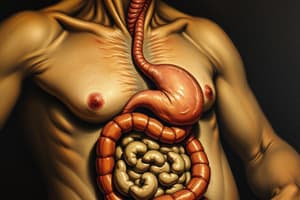Podcast
Questions and Answers
What is a common effect of changes in the mouth of older adults?
What is a common effect of changes in the mouth of older adults?
- Increased digestion of carbohydrates
- Difficulty in chewing and altered taste perception (correct)
- Faster movement of food in the esophagus
- Increased production of saliva
What is a result of the slowed down movement of food in the esophagus?
What is a result of the slowed down movement of food in the esophagus?
- Reflux, heartburn, and chest pain (correct)
- Faster digestion of proteins
- Increased absorption of nutrients
- Decreased risk of pneumonia
What is a consequence of the decrease in gastric acid and digestive enzymes in the stomach?
What is a consequence of the decrease in gastric acid and digestive enzymes in the stomach?
- Faster movement of food in the small intestine
- Improved protein digestion
- Increased risk of diverticulitis
- Malabsorption of nutrients (correct)
What is a result of the change in gut flora in older adults?
What is a result of the change in gut flora in older adults?
What is a consequence of the slowed down movement of food in the small intestine?
What is a consequence of the slowed down movement of food in the small intestine?
What is a common effect of changes in the large intestine of older adults?
What is a common effect of changes in the large intestine of older adults?
What is a potential consequence of difficulty in swallowing in older adults?
What is a potential consequence of difficulty in swallowing in older adults?
What is a common issue experienced by up to 50% of older adults?
What is a common issue experienced by up to 50% of older adults?
Why are regular dental check-ups necessary for older adults?
Why are regular dental check-ups necessary for older adults?
What is the primary focus of a balanced diet for older adults?
What is the primary focus of a balanced diet for older adults?
What is the purpose of nutritional counseling for older adults?
What is the purpose of nutritional counseling for older adults?
Why is medication management crucial for older adults?
Why is medication management crucial for older adults?
What is a common issue that affects the blood vessels in the digestive system of older adults?
What is a common issue that affects the blood vessels in the digestive system of older adults?
Why are regular medical check-ups necessary for older adults?
Why are regular medical check-ups necessary for older adults?
What is a potential consequence of constipation in older adults?
What is a potential consequence of constipation in older adults?
Flashcards are hidden until you start studying
Study Notes
- In older adults, digestive problems are common due to changes in the digestive system associated with aging.
- These changes can lead to difficulties in digestion, absorption, and utilization of nutrients, increasing the risk of nutritional deficiencies.
- In the mouth, older adults may experience changes in the mucosa, tongue, and gums, leading to tooth loss, difficulty in chewing, and altered taste perception.
- The production of saliva decreases, affecting the breakdown of carbohydrates, and the sense of taste is impaired, leading to a loss of appetite.
- Difficulty in swallowing (dysphagia) can occur due to changes in the pharynx, leading to food avoidance, and an increased risk of pneumonia.
- In the esophagus, the movement of food is slowed down, leading to reflux, heartburn, and chest pain.
- In the stomach, the production of gastric acid and digestive enzymes decreases, affecting protein digestion and leading to malabsorption.
- The change in gut flora can lead to an overgrowth of bacteria, causing symptoms like bloating, discomfort, and diarrhea.
- In the small intestine, the absorption of nutrients is impaired, leading to malabsorption, and the growth of bacteria in the small intestine.
- The movement of food in the small intestine is slowed down, leading to an overgrowth of bacteria, and the production of toxic substances.
- In the large intestine, the movement of food is slowed down, leading to constipation, and an increased risk of diverticulitis.
- The blood vessels in the digestive system undergo changes, increasing the risk of bleeding, and the formation of diverticula.
- Up to 50% of older adults experience constipation, which can lead to fecal impaction, and can be a sign of underlying cognitive decline.
- A balanced diet is essential to manage digestive problems in older adults, with a focus on nutrient-dense foods, and avoiding foods that are high in fat, sugar, and salt.
- Regular dental check-ups are necessary to prevent tooth loss, and to identify any oral health problems.
- Nutritional counseling is recommended to ensure that older adults receive adequate nutrition, and to identify any nutritional deficiencies.
- Medication management is crucial to avoid adverse interactions, and to ensure that medications are not affecting digestion.
- Regular medical check-ups are necessary to identify any underlying health problems, and to prevent complications.
Studying That Suits You
Use AI to generate personalized quizzes and flashcards to suit your learning preferences.




